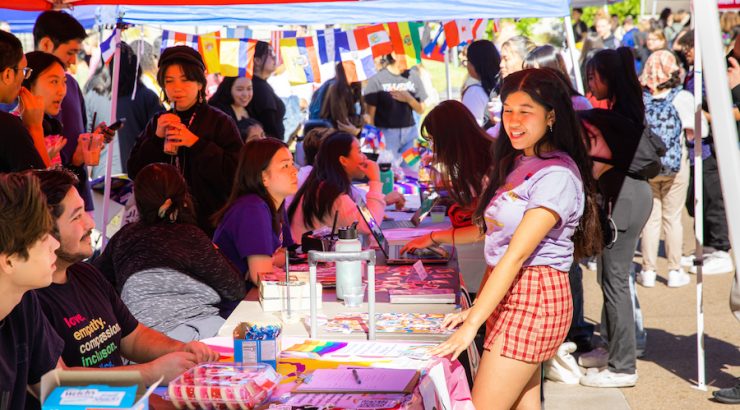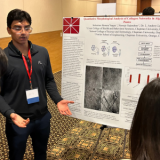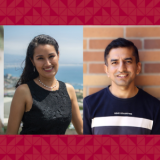
Chapman oSTEM Chapter Fosters Empowerment and Inclusion for LGBTQ+ Engineers Celebrating intersectional voices within STEM throughout and beyond Pride Month
June 23, 2023
For many members of the Fowler School of Engineering (FSE) community, Pride Month represents a time to honor and pursue growing opportunities for LGBTQ+ people in STEM. Within academic institutions like Chapman, fostering inclusivity and supporting diverse identities begins not only in the classroom, but among the many student organizations open to engineering students—including Chapman’s recently-founded Out in Science, Technology, Engineering, and Mathematics (oSTEM) chapter.
“Our whole purpose is to uplift queer voices in STEM because it is such a rigorous field; we want to create an environment where people feel validated not only in their intellectual pursuits but also in their identities,” said Chapman oSTEM Vice President Sean McCallum (Biochemistry, ‘26). “Sometimes, the general science world doesn’t think to include queer people, disabled people, or people of color in their work or research. By being proud of our identities, we can use that to help create things that are going to be impactful for more than just one group. While exclusion at times is horrifying and really harmful, when you’re able to speak up for yourself and for people like you, it will help create a world that is much, much better for everyone.”
The club was founded in spring 2023 and aims to develop spaces where LGBTQ+ people and allies in the sciences can meet a variety of needs: finding a sense of belonging, sharing experiences, and nurturing bonds across disciplines. In the future, McCallum and oSTEM’s Executive Board plan to cultivate community-building initiatives through the club, whether it be with game events, volunteer opportunities, or networking between local LGBTQ+ centers and STEM organizations. They also hope to work alongside existing intersectional organizations that engage with engineering students, such as Chapman’s Society of Women Engineers (SWE) and Girls Who Code chapters.
“As one of the co-founders, I’ve learned that even if something might not exist yet, don’t let that stop you from being the one to bring it into existence,” shared oSTEM President Briana Craig (Computer Science, ‘24). “Don’t be afraid to put yourself out there and put in the work to create a space where you and others will feel happy and safe.”
To Craig, oSTEM’s recent creation offers the unique opportunity to evolve alongside the newest of Chapman’s schools, improving campus-wide LGBTQ+ visibility over time. “This club serves as a way to help queer people in STEM feel empowered. By coming to a club where you can openly feel safe, members become comfortable in their own skin. Because the School of Engineering is so new, having this club established early-on will be beneficial for new students coming in as it keeps growing,” said Craig.
By extension, the organization’s core values of comfort, safety, representation, and openness reflect the School of Engineering’s commitment to equity, diversity, and inclusion initiatives. “At Chapman’s Fowler School of Engineering (FSE), we are committed to research and education programs that take a truly human centered approach,” stated Dr. L. Andrew Lyon, Founding Dean of FSE. “With that focus on Human Centered Engineering (HCE), our overarching philosophy is that we don’t just design and build things for a diverse set of users and patients, we design those things with the users and patients as an integral part of the process. To put it succinctly, the most inspired solutions to the challenges that we face today can only be developed by the most diverse collection of problem solvers from the greatest breadth of backgrounds and experiences. This philosophy is a key component of our mission towards Equity, Diversity, and Inclusion: it is incumbent upon all of us to learn and practice ethical engineering while appreciating and valuing the cultures, backgrounds, and identities of those we work with and those we design and build for.”
oSTEM’s formal launch in fall 2023 will reflect an opportunity for countless students across campus to simply know that their presence is valued—encouraging them to share their whole selves across academia, student life, and an abundance of experiences in between.
“I think it’s really important that we have these kinds of spaces; it shows that we’re moving towards a more inclusive campus,” said McCallum. “By saying, ‘hey, we have a space for you, we want to hear your voice, we care,’ we’re really showing that this is important to Chapman, this is important to Orange, and this is important to us. Hopefully with these voices being uplifted, more people in STEM will feel comfortable sharing these parts of themselves and that this will be reflected in future scientific work.”
Those interested in joining or supporting Chapman oSTEM are encouraged to learn more through their Instagram page and Linktree.

